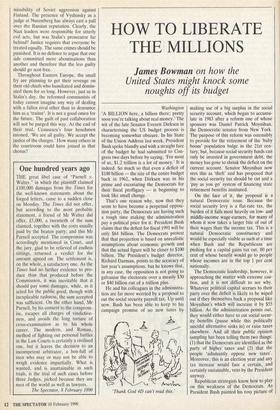HOW TO LIBERATE THE MILLIONS
James Bowman on how the
United States might knock some noughts of its budget
Washington 'A BILLION here, a billion there; pretty soon you're talking about real money.' The wit of the late Senator Everett Dirksen in characterising the US budget process is becoming somewhat obscure. In his State of the Union Address last week, President Bush spoke blandly and with a straight face of the budget he had submitted to Con- gress two days before by saying, 'For most of us, $1.2 trillion is a lot of money.' It is indeed. So much so that even a deficit of $100 billion — the size of the entire budget hack in 1962, when Dirksen was in his prime and excoriating the Democrats for their fiscal profligacy — is beginning to look like small change.
That's one reason why, now that they seem to have become a perpetual opposi- tion party, the Democrats are having such a tough time making the administration pay a political price for it. President Bush claims that the deficit for fiscal 1991 will be only $64 billion. The Democrats protest that that projection is based on unrealistic assumptions about economic growth and that the actual figure will be closer to $100 billion. The President's budget director, Richard Darman, points to the accuracy of last year's assumptions, but he knows that, in any case, the opposition is not going to galvanise the electorate over a measly $30 or $40 billion out of a trillion plus.
He and his colleagues in the administra- tion are far more worried by a proposal to cut the social security payroll tax. Up until now, Bush has been able to keep to his campaign promise of no new taxes by `Thank God 4D can't read this.' making use of a big surplus in the social security account, which began to accumu- late in 1983 after a reform one of whose sponsors was Daniel Patrick Moynihan, the Democratic senator from New York. The purpose of this reform was ostensibly to provide for the retirement of the 'baby boom' population bulge in the 21st cen- tury, but, because social security funds can only be invested in government debt, the money has gone to shrink the deficit on the current account. Senator Moynihan now sees this as 'theft' and has proposed that the social security tax should be cut and a .pay as you go' system of financing state retirement benefits instituted.
On the face of it, the proposal is a natural Democratic issue. Because the social security levy is a flat-rate tax, the burden of it falls most heavily on low- and middle-income wage-earners, for many of whom it now takes a larger bite of out of their .wages than the income tax. This is a natural Democratic constituency and would be especially visible as such at a time when Bush and the Republicans are pushing for a capital gains tax cut, 80 per cent of whose benefit would go to people whose incomes are in the top 1 per cent nationally.
The Democratic leadership, however, is approaching the matter with extreme cau- tion, and it is not difficult to see why. Whatever political capital accrues to their party over the deficit is likely to be wiped out if they themselves back a proposal like Moynihan's which will increase it by $55 billion. As the administration points out, they would either have to cut social secur- ity benefits (pause while this politically suicidal alternative sinks in) or raise taxes elsewhere. And all their public opinion sampling has been telling them two things: (1) that the Democrats are identified as the party of higher taxes and (2) that the people 'adamantly oppose new taxes'. Moreover, this is an election year and any tax increase would face a certain, and certainly sustainable, veto by the President anyway. Republican strategists know how to play on this weakness of the Democrats. As President Bush painted his rosy picture of
the State of the Union, he was interrupted by four and a half standing ovations. The half was when only the Republican side stood as he looked forward to a balanced budget 'no new taxes'. The White House chief of staff, John. Sununu, was quick to seize on this as evidence that the Democrats were 'the party of taxes', and Newt Gingrich, the Republican whip in the House of Representatives, called it 'an epic moment. It symbolised their 'addiction to taxes.. It demonstrated you can't trust the Party with your wallet.'
The chairman of the Senate Budget Committee, Sasser of Tennessee, replied sourly that he hoped 'Mr Sununu would convince the President to reverse his views on opposition to lowering taxes on working Americans' — a reference to the Moynihan proposal which identified it as a Democra- tic initiative without committing the party to support it. Representative Foley, the Speaker of the House and senior Demo- crat, adopted a similar tactic in replying to the State of the Union message.
Moynihan's bill will not he adopted, though some diluted, symbolic and inex- pensive version of it may pass. Its real impact is to be sought elsewhere. For one thing, it has reinvigorated the Democratic leadership's fight against the capital gains tax reduction, hitherto regarded as virtual- ly a certain presidential victory in this session of Congress. Everybody agrees that the • measure would temporarily increase revenue but 'a tax cut for the rich' is looking less politically possible to Demo- crats who were previously well-disposed to it but who are fighting shy of a tax cut for the non-rich. Bush has tried to anticipate this pi ohletn by coupling his pet project to a mild tax break for 'family savings accounts', a proposal which Senator Sasser — rapidly becoming the master of the mixed metaphor — said was 'simply a crumb that they appear to be tossing in the direction of middle-class people as a way to cover their flank'.
If the reduction in capital gains tax does not pass this year it could well contribute to a general economic slowdown and throw the country, and the world economy, into recession. Watch out, Europe! Also be- ware of Democrats stalking a 'peace di- vidend'. Bush rather cleverly attempted to forestall them by his surprise announce- ment withdrawing an additional 80,000 troops from central Europe, but it now appears that this was not enough. Their benevolent impulses hamstrung by budget- ary constraints, the opposition is in the mood for a fight, and if they can't get the President on the Moynihan proposal they will turn with redoubled effort to cutting military spending.
This is already happening. Even re- sponsible Democrats like James Schlesin- ger, the former Defence Secretary, and Senator Sam Nunn, the chairman of the Senate Armed Services Committee, are now saying that European troop levels can come down even further and be damned to the allies: if we don't cop the potential savings for ourselves first, they will cut hack their own military presence on the Warsaw Pact frontier. In addition, Bush's proposals to modernise land-based strategic nuclear forces with Midgetman and MX mobile ballistic missile systems are in trouble: three former chairmen of the joint chiefs of staff have testified before Senator Nunn's committee that such mod- ernisation is no longer necessary.
As this is a political rather than a military judgment, it is hard to see whence
they derive their authority on the matter. But when it comes to the assessment of the Soviet threat in Europe, everybody is now an expert and to most experts it no longer exists. Whether or not that turns out to he true, it is indisputable that the conclusion was arrived at with the help of a lot of wishful thinking about those billions lock- ed up for 45 years in the defence budge.and soon to he liberated. The Bush administra- tion will have to play a very canny political game this year if we all are not to be left with little more than crumbs to cover our central European flank.



















































 Previous page
Previous page